Dr. Carrie Spell-Hansson is the CEO of the Folke Institute for Transformative Learning, a consulting, research, and training firm that develops, designs, and deploys programs in diversity equity and inclusion, leadership, communication, and more to help individuals and organizations acquire the skills and insights needed to achieve success in today’s global workplace. Carrie is a global educator, leading facilitator, executive advisor, and coach in personal and organizational effectiveness. She is also an expert on diversity, equity, inclusion, and belonging. Carrie’s mission is to empower women, young adults, leaders, and emerging leaders of any age to become the architects of a new world order of multiculturalism and conflict-free coexistence.
What does “entrepreneurship” mean to you?
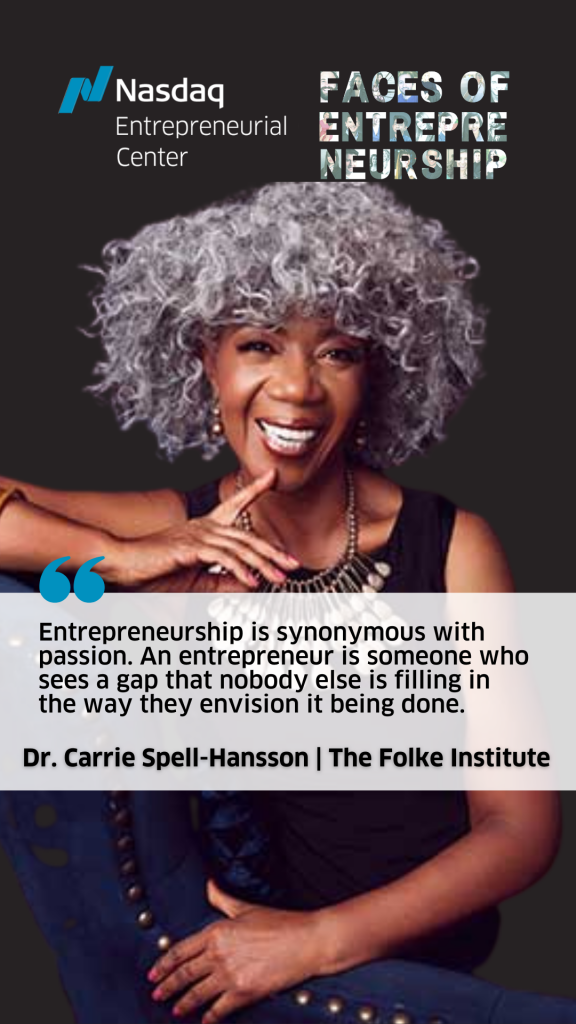 Dr. Carrie Spell-Hansson: Entrepreneurship is synonymous with passion. An entrepreneur is someone who sees a gap that nobody else is filling in the way they envision it being done. They have a vision of making something better. Their vision transforms into their passion. It is that passion that drives entrepreneurs to pour their time, energy, heart, and soul into building a business.
Dr. Carrie Spell-Hansson: Entrepreneurship is synonymous with passion. An entrepreneur is someone who sees a gap that nobody else is filling in the way they envision it being done. They have a vision of making something better. Their vision transforms into their passion. It is that passion that drives entrepreneurs to pour their time, energy, heart, and soul into building a business.
Tell us about your first experience with entrepreneurship.
CSH: I started my first consulting business with a handful of business cards, limited financial resources, and no business plan. What I did have was a passion for making a difference and for driving change within organizations and communities.
Networking connected me with my first client. They were located in another state, and ultimately, I relocated to work with them and became an executive in their company. If I were to offer my younger self advice, I’d remind myself to stay true to my own vision instead of becoming part of someone else’s.
What is your company’s origin story? What is the biggest reason you started your business? What did those early days look like and teach you?
CSH: I launched The Folke Institute when I realized that my intelligence, integrity, and work ethic were insufficient to break down the systemic barriers that hindered advancement, recognition, and respect for women, more specifically, women of African American descent. I knew I could create a diverse organization that promoted and enhanced organizational effectiveness through consulting, researching, and training. I had the skills and abilities to succeed. But, all of that did not keep me from the highs and lows of entrepreneurship.
During the first few years, I had contracts that were canceled and it wasn’t easy finding and hiring the right people. I often felt I was running a business single-handedly. However, I never doubted that one day I would change the world. I adopted the mantra, “every time I fall down, I will get up.” And I did get up. Every single time.
What do you wish you knew when you started? Is there anything you would do differently?
CSH: When I started my business, I did not realize that so many resources were available through nonprofits and organizations like the Small Business Association, Hello Alice, and, of course, the Nasdaq Entrepreneurial Center, that support women entrepreneurs. These resources include grants, loans, mentorship and coaching, and support in building a solid business plan. Had I realized the opportunities there, I would have requested mentorship, asked for advice on a business plan, and taken advantage of these resources before launching.
What does “success” look like for you? We’d love to hear your biggest, boldest dream? What do you think will help you achieve it?
CSH: I was five years old when I announced to my parents that I was going to change the world. That 5-year-old’s vision has not wavered. I want to change the way organizations approach diversity, equity, and inclusion. I want to streamline organizational efficiency and effectiveness. I want to build opportunities and break down biases and barriers for all people. This is the catalyst for everything The Folke Institute (TFI) does.
To achieve this success, I have been working with Goldman Sachs’ 10K program for Small Businesses. Their mentoring and guidance are helping me develop a growth plan that starts with building a larger team with a global presence. I am doubling my core team to 20 individuals and recruiting a minimum of 25 facilitators, trainers, and coaches to support programming in Mexico, Asia, Europe, and the United States.
Ultimately, TFI will launch highly customizable and immersive learning experiences through virtual reality (VR) and augmented reality (AR) that can be deployed without geographic boundaries and can be scalable to train a single person or an entire corporation employing thousands of personnel.
What is your superpower as an entrepreneur? What is your proudest and darkest moment so far?
CSH: My superpower is fierce resiliency. My ability to bounce back from setbacks has come from life experience, research, and training. Now I’ve taken what I’ve learned, and I teach others how to develop their own fierce resiliency.
I had to put that fierce resiliency into practice when I lost my husband in 2019. He was my biggest advocate and a huge support in growing my business. It was one of the darkest moments in my journey. That experience showed me exactly how fiercely resilient I am.
Another moment of fierce resiliency was completing my Ph.D. Achieving that degree was a progressive 20-year journey. Many times I had to stop to focus on other things. But I always bounced back and was able to refocus on that goal. Now I’m the proud owner of the title, Dr. Carrie Spell-Hansson.
What are your personal driving principals, your top values?
CSH: I value respect, commitment, authenticity, and integrity. As the founder and CEO of TFI, I strive for perfection and settle for excellence. Early on, I realized that true “perfection” is doing your very best and giving it your all. I know that at the end of the day, I can feel proud of what I’ve put out into the world — especially when I recognize others adopting a new way of thinking that breaks down biases and barriers. When you have done your very best, you can say you have achieved excellence.
How have your personal principles and values shaped your company’s values and principles? Give us some examples.
CSH: In Swedish, the word Folke is defined as people representing a way of life; the originators of customs, beliefs, and practices in a culture. My personal values of respect, commitment, authenticity, and integrity are embedded in the very name of my company. The Folke Institute’s mission is to help organizations build workplaces that support and represent all people and all cultures.
We emulate that in our logo which is a radiant array of individual parts unified in a circular form. It represents progression, acceptance, and transformation.
Finally, we use the icon of the Boabab tree, also known as the tree of life. Native to Africa, every part of the tree serves a purpose. Its leaves are medicine. Its bark becomes fabric. Its fruit is food, and its trunk is shelter. The Folke Institute is like this tree of life, offering something to every organization seeking a better sustainable future.
What’s it like to work alone or with your partners?
CSH: When I started TFI, I realized quickly that my success as a solopreneur could grow exponentially by building connections and partnerships. While The Folke Institute began as a solo endeavor, making the change to work with others has expanded my clientele and profitability.
Do you have a mentor? Tell us about what makes them valuable to you and your business.
CSH: I am currently being mentored through Goldman Sachs’ 10K Small Business Program. As a member of Cohort 18, I am paired with a business advisor who has helped me grow personally and professionally. They are my sounding board for exploring ideas and brainstorming opportunities. They offer suggestions and resources for the goals that I have identified. And they are helping me build a five-year growth plan.
What role does mentorship play in your world (as a mentor or mentee)?
CSH: I have spent many years acting as a mentor to others. Being able to give back in this way is very important to me. I know my passion for what I do is fueled by supporting and empowering women, young adults, emerging leaders, teams, and organizations. My goal is to help them see what is possible and support them in achieving a better future.
Have you raised outside capital so far?
CSH: No, I have not raised any outside capital so far. It is less about choosing not to fundraise and more about not knowing the right avenues and resources to tap into to fundraise for the kind of work that The Folke Institute does.
Where do you meet investors?
CSH: My participation in various small business programs, trade conferences, and networking events offers me opportunities to meet and pitch to investors.
Many entrepreneurs continue to perfect their daily routines to support their work and greater vision; would you mind sharing your morning routine or a regular ritual that grounds your work each day?
CSH: I have a morning routine that begins with meditation and self-reflection. I find that starting my day this way grounds my workflow and daily tasks. I follow this with exercise and then prepare all my food for the day. This enables me to fuel my body with what it needs despite last-minute changes in my schedule. I have also learned the importance of taking short periodic breaks during the day to build in a moment of quiet. Like meditation, it refocuses me on my tasks and work responsibilities.
What are you reading or have read?
CSH: As a lifelong learner, I am constantly growing from the words and thoughts of others. I
am currently enjoying “Grit: The Power of Passion and Perseverance” by Angela Duckworth. This book reminds me my success is founded on doing things that bring joy and hold purpose.
A book I recommend for those looking to change their workplace from within is “Tempered Radicals: How People Use Difference to Inspire Change at Work” by Debra E. Myerson. For those that enjoy a more poetic structure, I loved “The Seasons of the Soul: The Poetic Guidance and Spiritual Wisdom of Herman Hesse” by Herman Hesse, a German-born Swiss writer that won the Nobel Prize for literature in 1946. And finally, for those that are working to prioritize personal values within the many responsibilities and tasks in their lives, I suggest “Your 168: Finding Purpose and Satisfaction in a Values-Based Life” by Harry M. Kraemer, Jr.
Where do you go for inspiration?
CSH: I turn to nature whenever I need motivation, clarification, or ideas. The simple act of taking a walk and breathing in the outdoors often changes my perspective and inspires me creatively.
Do you have a favorite quote, mantra, or words of wisdom to get through the tough days?
CSH: My mantra for tough days is “I win some and I learn some.” I do not consider a tough day as a failure or a loss. Everything that happens teaches me something new about myself, running a successful business, or understanding other people and their motivations.
What is a problem that keeps you up at night?
CSH: Making sustainable, impactful change that will move humanity in the direction of living, working, and playing together in harmony keeps me up at night. I want that change to happen individually, organizationally, and globally. The programs The Folke Institute has built are meant to create a ripple effect that produces this kind of change.
How do you think about helping others through your work?
CSH: I believe that my work is essential to the future of our world. Between the impact of the Covid-19 pandemic and the constant political and racial unrest, change is no longer optional. My work is about empowering people to be the architect of their own lives and actively participate in building a world they want to live in.
What advice do you have for fellow (and aspiring) entrepreneurs building and leading teams?
CSH: My advice to fellow (and aspiring) entrepreneurs is three-fold. First, never give up your vision to build someone else’s. Second, find a mentor that can guide your journey. And third, network and connect with other entrepreneurs to help build each other up.
What kind of an entrepreneur do you want to be known as – as in, what do you want your legacy to be?
CSH: I want my entrepreneurial legacy to echo this modified Maya Angelou quote, “I would like to be known as an intelligent woman, a courageous woman, a loving woman, a woman who made a difference in the lives of the people she taught by being an example.”
Do you have someone you’d like to nominate to be profiled in our Faces of Entrepreneurship series? Please let us know by emailing media@thecenter.nasdaq.org or submit your nomination using this form.
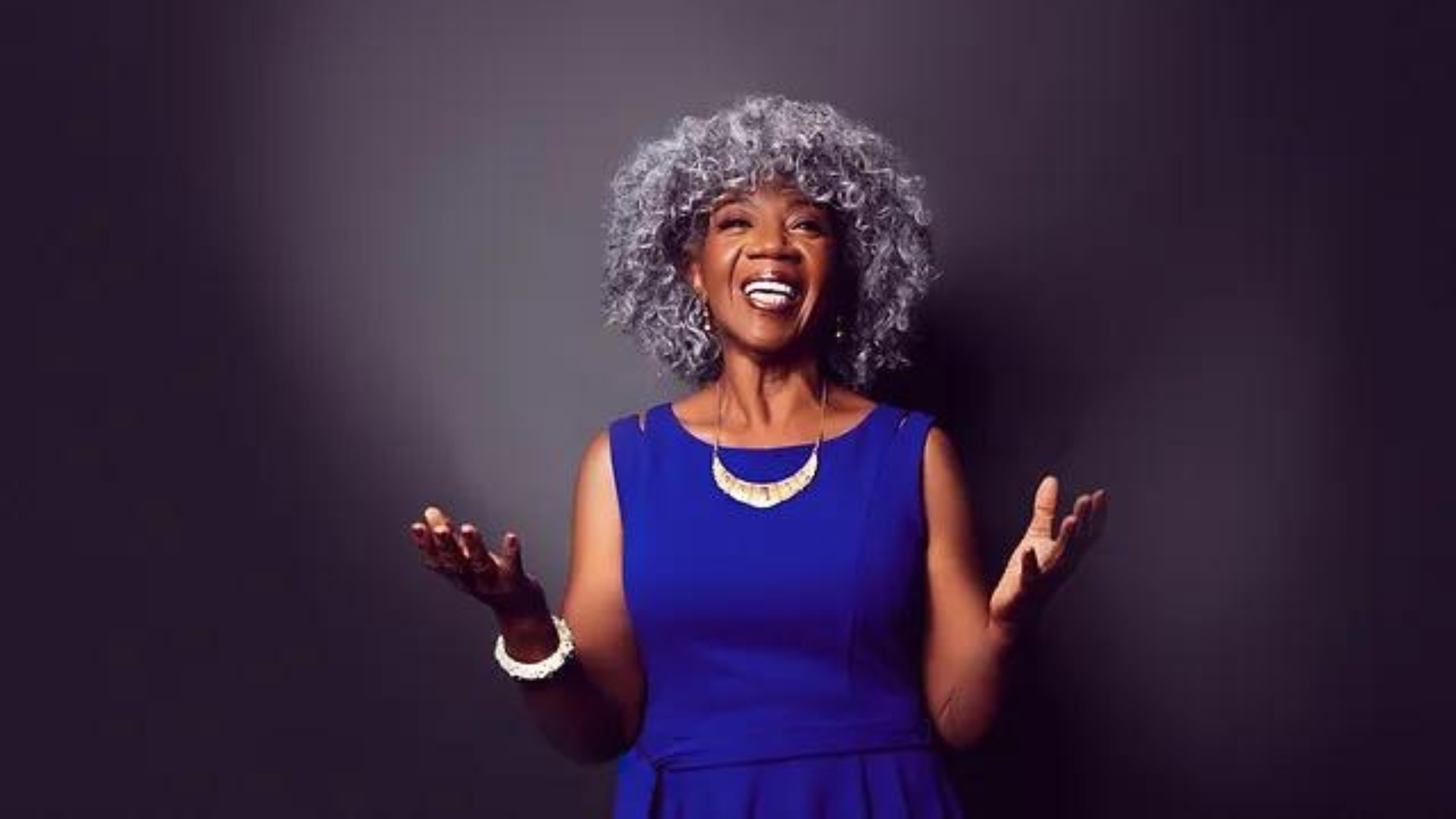
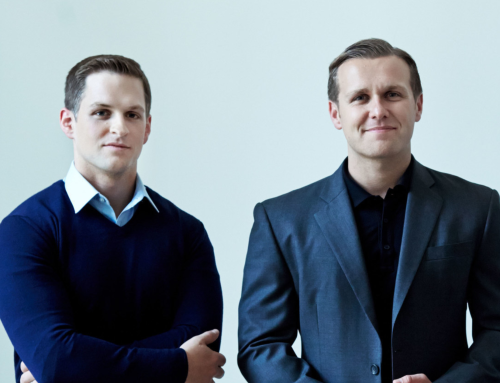
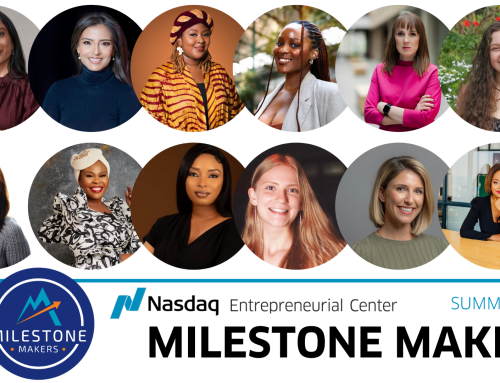
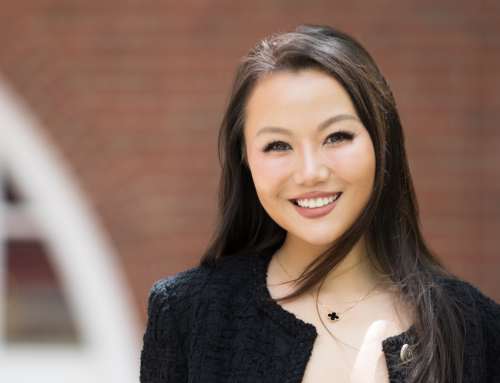
Invite a Friend
Close